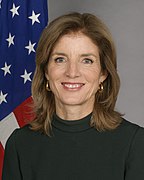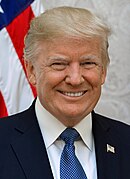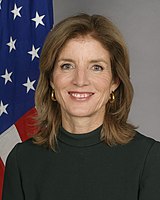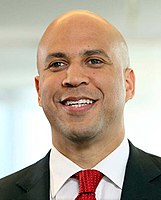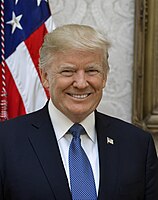2016 United States presidential election (CK)
| |||||||||||||||||||||||||||||
All 538 electoral votes of the Electoral College 270 electoral votes needed to win | |||||||||||||||||||||||||||||
|---|---|---|---|---|---|---|---|---|---|---|---|---|---|---|---|---|---|---|---|---|---|---|---|---|---|---|---|---|---|
| |||||||||||||||||||||||||||||
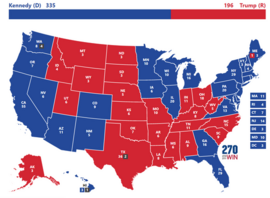 Presidential election results map. Blue denotes states won by Kennedy/Booker, and red denotes those won by Trump/Pence. Numbers indicate electoral votes cast by each state and the District of Columbia. | |||||||||||||||||||||||||||||
| |||||||||||||||||||||||||||||
The 2016 United States presidential election was the 58th quadrennial presidential election, held on Tuesday, November 8, 2016. The Democratic ticket of senators Caroline Kennedy and Cory Booker defeated the Republican ticket of businessman Donald Trump and Indiana Governor Mike Pence. Despite a 59.5% turnout, Kennedy received roughly 77 million votes, the highest of any winning presidential candidate, and which surpassed that of Barack Obama's record of 69.5 million votes from 2008. With that, Kennedy also received the most votes ever cast for a candidate in a US presidential election, also surpassing Barack Obama in this respect.
As per the Twenty-second Amendment to the United States Constitution, incumbent president Barack Obama was ineglible to seek a third term. Former secretary of state Hillary Clinton was the initial frontrunner in the Democratic primary, having been initially ahead of self-described democratic socialist Senator Bernie Sanders, but was ultimately defeated by Senator Caroline Kennedy from New York, thereby becoming the first female presidential nominee of a major American party. Meanwhile, businessman Donald Trump emerged as the Republican front-runner, defeating senators Ted Cruz and Marco Rubio, Ohio Governor John Kasich, and others. Meanwhile, the Libertarian Party nominated former New Mexico Governor Gary Johnson, while the Green Party nominated Jill Stein. Trump's right-wing populist nationalist campaign, which promised to "Make America Great Again" and opposed political correctness, illegal immigration, and many United States free-trade agreements garnered extensive free media coverage due to Trump's inflammatory comments, while Kennedy, through her rival campaign, "Camelot Is Back", otherwise strongly emphasised her notable background as a prominent member of the Kennedy family, her political experience in contrast to Trump's, denounced the American businessmen's inflammatory and aggressive rhetoric, while advocating for a continuation and expansion of President Obama's policies, racial equality, LGBT and women's rights, and notably, welfare capitalism.
The tone of the election was generally described as divisive and negative, with Trump facing controversy over his views on race and immigration, incidents of violence against protesters at his rallies, and numerous sexual misconduct allegations including the infamous Access Hollywood tape. On the other hand, Kennedy, who despite arousing some minor controversy as a result of her separation from her husband, Edwin Schlossberg just a year prior, was nonetheless praised by commentators and received overwhelmingly positive media coverage in contrast to Trump, with media outlets most frequently emphasising her familial ties to the late John F. Kennedy and her uncles, Robert F. Kennedy and Ted Kennedy, both of whom are highly regarded by the American public.
Despite mostly leading in almost every nationwide and swing-state poll, there was some initial concern that the relatively short amount of political experience held by Kennedy, coupled with a rather minor scandal revolving around her separation from her husband would ultimately prove to be her downfall. However, on Election Day, Kennedy ultimately achieved a relatively comfortable victory over her Republican opponent, who she defeated in most key states. In the end, Kennedy received 335 electoral votes while Trump only received 196 electoral votes. As a result, Kennedy became the first president with no prior military experience and the second to come from the Kennedy family, after her father, John F. Kennedy, who served as the 35th President of the United States from 1961 to 1963. Meanwhile, Kennedy collectively became the first Democrat to win the state of Arizona since 1996 and Georgia since 1992.
The subsequent period between Election Day and Kennedy's inauguration as President on January 21, 2017, was largely described by most media outlets as "tense" and "extremely dangerous", with supporters of Donald Trump holding heated and aggressive rallies and protests across the country objecting to the results, with Trump himself also refusing to recognise the results. In response, outgoing President Barack Obama controversially had a large number of National Guard troops sent in to a select number of states across the country with the intent of preserving law and order, as instances of violence involving Trump and Kennedy supporters begin to pick up pace. At the same time, small to medium-scale riots also begin to appear at a number of cities across the United States, causing Kennedy, a longtime New York resident to be evacuated to Washington D.C. by President Obama, where she remained alongside her three children until her inauguration.
Eventually, on January 21, 2017, Kennedy was later safely inaugurated as the 45th President of the United States, with no major incidents whatsoever. Then, on the following afternoon, she went on to give a speech condemning the riots, as well as the refusal of her Republican opponent to concede the election from the Arlington National Ceremony, the burial place for her late parents and famous uncles.
Background
Article Two of the United States Constitution provides that the President and Vice President of the United States must be natural-born citizens of the United States, at least 35 years old, and residents of the United States for a period of at least 14 years. Candidates for the presidency typically seek the nomination of one of the political parties, in which case each party devises a method (such as a primary election) to choose the candidate the party deems best suited to run for the position. Traditionally, the primary elections are indirect elections where voters cast ballots for a slate of party delegates pledged to a particular candidate. The party's delegates then officially nominate a candidate to run on the party's behalf. The general election in November is also an indirect election, where voters cast ballots for a slate of members of the Electoral College; these electors in turn directly elect the president and vice president.
President Barack Obama, a Democrat and former U.S. senator from Illinois, was ineligible to seek reelection to a third term due to the restrictions of the American presidential term limits established by the Twenty-second Amendment; in accordance with Section 1 of the Twentieth Amendment, his term expired at noon eastern standard time on January 20, 2017.
Primary process
Both the Democratic and Republican parties, as well as third parties such as the Green and Libertarian parties, held a series of presidential primary elections and caucuses that took place between February and June 2016, staggered among the 50 states, the District of Columbia, and U.S. territories. This nominating process was also an indirect election, where voters cast ballots for a slate of delegates to a political party's nominating convention, who in turn elected their party's presidential nominee.
Speculation about the 2016 campaign began almost immediately following the 2012 campaign, with New York magazine declaring that the race had begun in an article published on November 8, two days after the 2012 election. On the same day, Politico released an article predicting that the 2016 general election would be between Clinton and former Florida Governor Jeb Bush, while an article in The New York Times named New Jersey Governor Chris Christie and Senator Cory Booker from New Jersey as potential candidates.
Nominations
Democratic Party
Primaries
Former secretary of state Hillary Clinton, who also served in the U.S. Senate and was the First Lady of the United States, became the first Democrat in the field to formally launch a major candidacy for the presidency with an announcement on April 12, 2015, via a video message. While nationwide opinion polls in 2015 indicated that Clinton was the front-runner for the 2016 Democratic presidential nomination, she faced strong challenges from Independent Senator Bernie Sanders of Vermont, who became the second major candidate when he formally announced on April 30, 2015, that he was running for the Democratic nomination. September 2015 polling numbers indicated a narrowing gap between Clinton and Sanders. On May 30, 2015, former Governor of Maryland Martin O'Malley was the third major candidate to enter the Democratic primary race, followed by the former independent governor and Republican senator of Rhode Island Lincoln Chafee on June 3, 2015, former Virginia Senator Jim Webb on July 2, 2015, and former Harvard law professor Lawrence Lessig on September 6, 2015. However, perhaps the most shocking announcement came about on May 29, 2015, when New York Senator Caroline Kennedy formally announced her intention to run for the Democratic nomination in a short video commemorating her late father's posthumous 100th birthday.
On October 20, 2015, Webb announced his withdrawal from the primaries and explored a potential Independent run. The next day Vice-President Joe Biden decided not to run, ending months of speculation, stating, "While I will not be a candidate, I will not be silent." On October 23, Chafee withdrew, stating that he hoped for "an end to the endless wars and the beginning of a new era for the United States and humanity." On November 2, after failing to qualify for the second DNC-sanctioned debate after the adoption of a rule change negated polls that before might have necessitated his inclusion in the debate, Lessig withdrew as well, narrowing the field to Clinton, Kennedy, O'Malley, and Sanders.
On February 1, 2016, in an extremely close contest, Clinton narrowly won the Iowa caucuses by a margin of 0.1 points over Sanders. After winning no delegates in Iowa, O'Malley, withdrew from the presidential race that day. On February 9, Sanders bounced back to win the New Hampshire primary with roughly 53% of the vote. However, in the case of the remaining two February contests, both the Nevada caucuses and the South Carolina primary were won by Kennedy, who secured 58% and 88% of the vote respectively. On March 1, 11 states in total participated in the first of four "Super Tuesday" primaries. Clinton won Alabama and Tennessee, Sanders won Oklahoma and his home state of Vermont, while Kennedy won the remaining states of Arkansas, Georgia, Massachusetts, Texas, Virginia, Colorado, and Minnesota. The following weekend, Sanders scored a single victory in Kansas, while Nebraska and Maine were won by Kennedy, and Louisiana by Clinton. On March 8, Kennedy narrowly won Michigan over her two primary opponents, but ultimately came in second place behind Clinton in Mississippi with a 3-point margin.
Then, on March 15, the date of the second "Super Tuesday" primaries, Kennedy swept the states of Florida, Illinois, Missouri and Ohio, leaving Clinton with a single victory in North Carolina. Between March 22 and April 9, Sanders went on to win three caucuses in Alaska, Hawaii, and Wyoming, while Kennedy went on to win four caucuses in total for herself in Washington, Arizona, Wisconsin and Utah, leaving Clinton only with the state of Idaho, which she won. On April 19, Kennedy decisively defeated Clinton in New York, with 60% of the vote. Meanwhile, on April 26, the date of the third "Super Tuesday" primaries, Clinton narrowly won both Connecticut and Pennslyvania, but lost Delaware and Maryland to Kennedy, while Sanders secured Rhode Island. Then, over the course of May, Sanders was gifted with two further victories in Indiana and West Virginia, while Kennedy took both Oregon and Kentucky. The territory of Guam was otherwise won by Clinton. By this time, with Kennedy far ahead with at least 25 states won, and with Clinton and Sanders only roughly carrying 8 to 9 states each, most observers and media outlets begin to forecast Kennedy herself as the eventual winner of the primaries under the current circumstances.
Soon enough, in the days and weeks that followed, predictions by the media on the race started to progressively become more of a reality, as evidenced by the two consecutive wins for Kennedy in the Virgin Islands and Puerto Rico. Eventually, on the eve of what would be the day of the primaries for California, New Jersey, New Mexico, South Dakota, North Dakota, and Montana, Clinton, perhaps due to both her poor performance in the primaries and her dangerously volatile approval ratings, announced that she was formally dropping out of the race, while also urging supporters to vote for Kennedy. Then, come the following day, Kennedy delivered an expectedly strong performance, as she defeated Sanders in most of the remaining states, namely California, New Jersey, Montana, and both Dakotas, thereby leaving the latter with only the state of New Mexico. Consequently, with the results becoming ever more apparent, the Vermont senator himself also followed suit by dropping out of the race, which he did so in a speech to supporters in California. Like Clinton, Sanders himself also called for his supporters to vote for Kennedy, whom he referred to in a speech as "a strong and powerful woman who will carry on the legacy of the late and beloved John F. Kennedy". The primaries eventually concluded on June 14 with a simple win for Kennedy in the District of Columbia, where she virtually ran unopposed as a result of Sanders's withdrawal.
In what was later described by CNN as a "proud moment of unity", both Clinton and Sanders went on to endorse and subsequently appear together with Kennedy at a number of rallies held prior to the eventual presidential election.
Nominees
| 2016 Democratic Party ticket | |
|---|---|
| Caroline Kennedy | Cory Booker |
| for President | for Vice President |
| U.S. Senator from New York (2009–2016) |
U.S. Senator from New Jersey (2013–2016) |
| Campaign | |
Candidates
The following candidates were frequently interviewed by major broadcast networks and cable news channels or were listed in publicly published national polls. Lessig was invited to one forum but withdrew when rules were changed which prevented him from participating in officially sanctioned debates.
| Candidates in this section are sorted by date of withdrawal from the primaries | ||||||||
| Bernie Sanders | Hillary Clinton | Martin O'Malley | Lawrence Lessig | Lincoln Chafee | Jim Webb | |||
|---|---|---|---|---|---|---|---|---|
| U.S. senator from Vermont (2007–present) |
67th U.S. Secretary of State (2009–2013) |
61st governor of Maryland (2007–2015) |
Harvard Law professor (2009–2016) |
74th Governor of Rhode Island (2011–2015) |
U.S. senator from Virginia (2007–2013) | |||
| Campaign | Campaign | Campaign | Campaign | Campaign | Campaign | |||
| W: June 9, 2016 |
W: June 6, 2016 |
W: February 1, 2016 |
W: November 2, 2015 |
W: October 23, 2015 |
W: October 20, 2015 | |||
Vice presidential selection
Following her victories in Oregon and Kentucky, Kennedy, now finding herself in a mostly comfortable position to eventually become the party nominee for the 2016 presidential election, would begin to consider her own personal pick for future vice president, with the initial list said to have contained around 20 to 30 individuals in total. Then, with Clinton's withdrawal from the race, rumours begin to flout that Kennedy would be considering the former secretary of state as her running mate, thereby potentially creating a ticket composed entirely of women, the first of its kind. However, this did not ultimately come into fruition. Meanwhile, the progressive Massachusetts senator Elizabeth Warren was also touted by some as a potential vice candidate pick, as both women are largely considered by many to have the same brand of politics.
Then, following the withdrawal of Bernie Sanders from the race, followed by a final victory in the District of Columbia for Kennedy, the latter's shortlist was said to have somewhat narrowed, with names now including senators Cory Booker from New Jersey, Tim Kaine from Virginia, and Amy Klobuchar from Minnesota, former Ohio state senator Nina Turner, and Colorado governor John Hickenlooper. Then, shortly after her unanimous victory in the District of Columbia, Kennedy declared in an interview with MSNBC that "there are only five people left for consideration", although she did not subsequently provide any names for those supposed remaining five candidates.
On July 20th, in a televised speech from her residence in New York, Kennedy announced that New Jersey senator Cory Booker, whom she proceeded to praise for his "Ted Kennedy-like oratory skills" and his "commitment to the lives of everyday Americans", would be her running mate for the election. Then, on July 22nd, at the 2016 Democratic National Convention in Philadelphia, Pennsylvania, delegates present at the convention formally nominated the Democratic ticket.
Republican Party
Primaries
With seventeen major candidates entering the race, starting with Ted Cruz on March 23, 2015, this was the largest presidential primary field for any political party in American history, before being overtaken by the 2020 Democratic presidential primaries.
Prior to the Iowa caucuses on February 1, 2016, Perry, Walker, Jindal, Graham, and Pataki withdrew due to low polling numbers. Despite leading many polls in Iowa, Trump came in second to Cruz, after which Huckabee, Paul, and Santorum withdrew due to poor performances at the ballot box. Following a sizable victory for Trump in the New Hampshire primary, Christie, Fiorina, and Gilmore abandoned the race. Bush followed suit after scoring fourth place to Trump, Rubio, and Cruz in South Carolina. On March 1, 2016, the first of four "Super Tuesday" primaries, Rubio won his first contest in Minnesota, Cruz won Alaska, Oklahoma, and his home state of Texas, and Trump won the other seven states that voted. Failing to gain traction, Carson suspended his campaign a few days later. On March 15, 2016, the second "Super Tuesday", Kasich won his only contest in his home state of Ohio, and Trump won five primaries including Florida. Rubio suspended his campaign after losing his home state.
Between March 16 and May 3, 2016, only three candidates remained in the race: Trump, Cruz, and Kasich. Cruz won the most delegates in four Western contests and in Wisconsin, keeping a credible path to denying Trump the nomination on the first ballot with 1,237 delegates. Trump then augmented his lead by scoring landslide victories in New York and five Northeastern states in April, followed by a decisive victory in Indiana on May 3, 2016, securing all 57 of the state's delegates. Without any further chances of forcing a contested convention, both Cruz and Kasich suspended their campaigns. Trump remained the only active candidate and was declared the presumptive Republican nominee by Republican National Committee chairman Reince Priebus on the evening of May 3, 2016.
A 2018 study found that media coverage of Trump led to increased public support for him during the primaries. The study showed that Trump received nearly $2 billion in free media, more than double any other candidate. Political scientist John M. Sides argued that Trump's polling surge was "almost certainly" due to frequent media coverage of his campaign. Sides concluded "Trump is surging in the polls because the news media has consistently focused on him since he announced his candidacy on June 16." Prior to clinching the Republican nomination, Trump received little support from establishment Republicans.
Nominees
| 2016 Republican Party ticket | |
|---|---|
| Donald Trump | Mike Pence |
| for President | for Vice President |
| Chairman of The Trump Organization (1971–Present) |
50th Governor of Indiana (2013–Present) |
| Campaign | |
Candidates
Major candidates were determined by the various media based on common consensus. The following were invited to sanctioned televised debates based on their poll ratings.
Trump received 14,010,177 total votes in the primary. Trump, Cruz, Rubio and Kasich each won at least one primary, with Trump receiving the highest number of votes and Ted Cruz receiving the second highest.
| Candidates in this section are sorted by reverse date of withdrawal from the primaries | |||||||
| John Kasich | Ted Cruz | Marco Rubio | Ben Carson | Jeb Bush | Jim Gilmore | Carly Fiorina | Chris Christie |
|---|---|---|---|---|---|---|---|
| 69th Governor of Ohio (2011–2019) |
U.S. senator from Texas (2013–present) |
U.S. senator from Florida (2011–present) |
Dir. of Pediatric Neurosurgery, Johns Hopkins Hospital (1984–2013) |
43rd Governor of Florida (1999–2007) |
68th Governor of Virginia (1998–2002) |
CEO of Hewlett-Packard (1999–2005) |
55th Governor of New Jersey (2010–2018) |
| Campaign | Campaign | Campaign | Campaign | Campaign | Campaign | Campaign | Campaign |
| W: May 4 4,287,479 votes |
W: May 3 7,811,110 votes |
W: Mar 15 3,514,124 votes |
W: Mar 4 857,009 votes |
W: Feb 20 286,634 votes |
W: Feb 12 18,364 votes |
W: Feb 10 40,577 votes |
W: Feb 10 57,634 votes |
| Rand Paul | Rick Santorum | Mike Huckabee | George Pataki | Lindsey Graham | Bobby Jindal | Scott Walker | Rick Perry |
| U.S. senator from Kentucky (2011–present) |
U.S. senator from Pennsylvania (1995–2007) |
44th Governor of Arkansas (1996–2007) |
53rd Governor of New York (1995–2006) |
U.S. senator from South Carolina (2003–present) |
55th Governor of Louisiana (2008–2016) |
45th Governor of Wisconsin (2011–2019) |
47th Governor of Texas (2000–2015) |
| Campaign | Campaign | Campaign | Campaign | Campaign | Campaign | Campaign | Campaign |
| W: Feb 3 66,781 votes |
W: Feb 3 16,622 votes |
W: Feb 1 51,436 votes |
W: December 29, 2015 2,036 votes |
W: December 21, 2015 5,666 votes |
W: November 17, 2015 222 votes |
W: September 21, 2015 1 write-in vote in New Hampshire |
W: September 11, 2015 1 write-in vote in New Hampshire |
Vice presidential selection
Trump turned his attention towards selecting a running mate after he became the presumptive nominee on May 4, 2016. In mid-June, Eli Stokols and Burgess Everett of Politico reported that the Trump campaign was considering New Jersey Governor Chris Christie, former Speaker of the House Newt Gingrich from Georgia, Senator Jeff Sessions of Alabama, and Oklahoma Governor Mary Fallin. A June 30 report from The Washington Post also included Senators Bob Corker from Tennessee, Richard Burr from North Carolina, Tom Cotton from Arkansas, Joni Ernst from Iowa, and Indiana governor Mike Pence as individuals still being considered for the ticket. Trump also said he was considering two military generals for the position, including retired Lieutenant General Michael Flynn.
In July 2016, it was reported that Trump had narrowed his list of possible running mates down to three: Christie, Gingrich, and Pence.
On July 14, 2016, several major media outlets reported that Trump had selected Pence as his running mate. Trump confirmed these reports in a message Twitter on July 15, 2016, and formally made the announcement the following day in New York. On July 19, the second night of the 2016 Republican National Convention, Pence won the Republican vice presidential nomination by acclamation.
